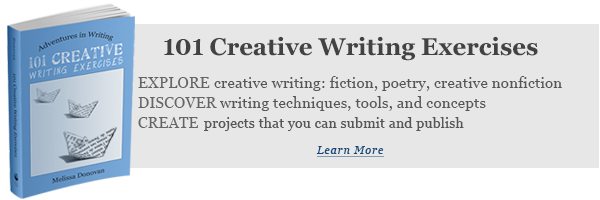101 Creative Writing Exercises takes writers on an adventure through the world of creative writing.
The book is packed with writing exercises that are fun and practical. Not only will these exercises inspire you, they’ll impart helpful writing techniques and offer valuable writing practice.
Try your hand at fiction, poetry, and creative nonfiction, including freewriting, journaling, memoir, and article writing.
Today, I’d like to share an exercise from 101 Creative Writing Exercises. From “Chapter 10: Article and Blog Writing,” this creative writing exercise is called “Titles and Headlines.”
Titles and Headlines
A title or headline is the first point of contact that a reader will have with your writing. It’s your introduction, a chance to entice and intrigue readers so they want to buy your book or read your article. An effective title piques a reader’s curiosity and provides some idea of what the piece is about.
Some authors use titles as part of their brand. Sue Grafton worked her way through the alphabet with her Kinsey Millhone series, which includes the titles A is for Alibi, B is for Burglar, and so on (aff links). Many romance novelists use words like kiss, love, or dance in their titles. In the sci-fi realm, anything associated with space is fair game: galaxy, universe, Mars, and stars. And a well-placed mythological term, such as dragon or wizard clearly marks a fantasy novel.
In addition to book titles, many authors have a separate title for a series. This allows the author to use two different titles on a single piece of work. New readers will be drawn in by the book title while existing fans will gravitate toward the series title.
In poetry, titles can be more abstract. A poem’s title may seem irrelevant to the poem. Many poets take a word or phrase from the poem and use it as a title. Others will use a title that functions as part of the poem. The best poem titles evoke an image and give the reader an indication of what the poem will feel like.
Magazines use headlines prominently displayed on the front cover to entice customers. Newspapers use them to draw readers into a story, and bloggers, as many of you know, use headlines to generate buzz, links, and shares on social media.
The Exercise
Choose one of your writing projects or ideas and make a list of possible titles. Don’t run off a quick list. Take some time to contemplate each title and consider how it will resonate with readers and impact your project’s success. Make sure the titles and headlines you write represent the piece accurately. Avoid labels, words, and phrases that are misleading.
Tips: Look to some successful works by authors you admire to get ideas for titles. Peruse magazines, newspapers, and blogs for headline ideas.
Variations: If you don’t have any writing projects that need titles, then make a list of alternative titles for some of your favorite books, magazines, movies, TV shows, articles, and poems.
Applications: Every piece of writing has to be titled, and a title or headline is essential in selling the piece to its audience. Developing catchy, intriguing titles is an essential writing skill.






Titles are very important. It took me almost 18 months of playing with wording, while continuing to edit and rewrite, to come up with the title to my now (newly) published novel: (Marvin’s) World of Deadheads.
I finally chose those words and then it took me a while to realize: if there was to be a series of books with these same characters in this same world (book two was already rattling around in my head) Marvin needed to be in parentheses.
My short story (published in Patchwork Path: Treasure Box anthology) about a man dying of breast cancer took forever to figure out. The story kind of focused on how little they had as a family and what he’d inherited from his mother and what his daughter could now expect to inherit from him. I finally came up with the title: “Heirlooms of Misfortune.”
Don’t shortchange yourself when it comes to the title of your work(s). I’ve got a submission at The New Yorker that could get rejected because of a weak title – and I STILL haven’t been able to come up with anything better.
Titles and names are the single most challenging aspect of writing for me, so I feel your pain. There are works and characters with titles and names that I think are absolutely perfect, and I wonder how authors came up with them. I would love to know more about how successful authors find great titles and names!
For most – if not all – of my stories, I pick a title before I even have the details worked out. Heck, I name it before I have named the characters. With all of the ideas running through my head, it helps for me to have something to call it, besides “That one where…”
Word play has always been a strong-suit of mine, so many of my titles for anything have double meanings. For example, the words Business, Affairs, and Matters, all have multiple meanings. (All three are used in the titles of a trilogy I’m writing.) In the story The Deadliest Game by Richard Connell, the reader discovers that “Game” has a double meaning.
But of course, the names aren’t permanent. Plots change, and certain titles become irrelevant. Some titles may never even be written, if they’re main ideas aren’t as catchy as their name. And I can’t be the only one who does this, right?
Well, Molly, you’re right. A title is one of the first things I come up with, if only for the purposes of naming the Word file. And I do have quite a few that are currently collecting dust in the virtual file cabinet. But, before anything gets sent out, I wrack my brain playing with words and phrases. I write them all down – longhand – until I’ve exhausted possibilities. I choose those which seem to resonate. Then, with the help of my wife and a couple of friends who are aware of the plot and characters, I choose the final name.
I do the same thing: make lists of titles (and names). For example, in my story notebook, I keep a page (usually at the front or back of the notebook) that is dedicated to names.
It sounds like you often use what is called a working title for your projects. I do that too, sometimes, but usually the working title gets changed so often that I eventually drop it and revert to “that one where…” I love titles and names with double meanings. Those are definitely the best!